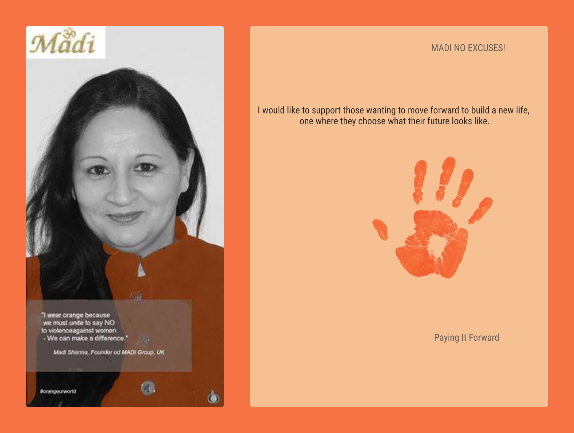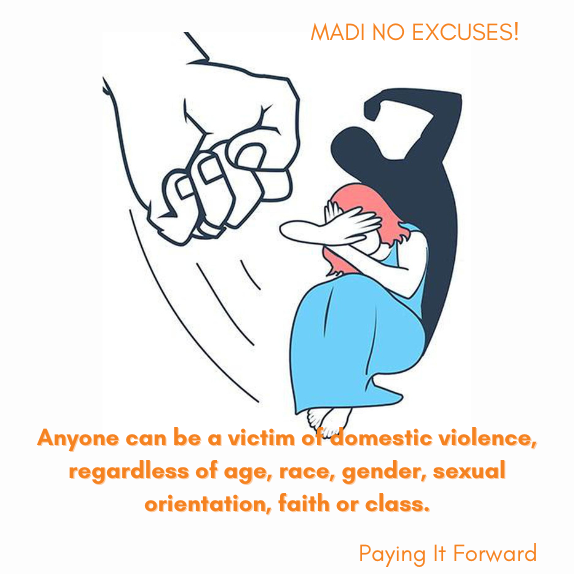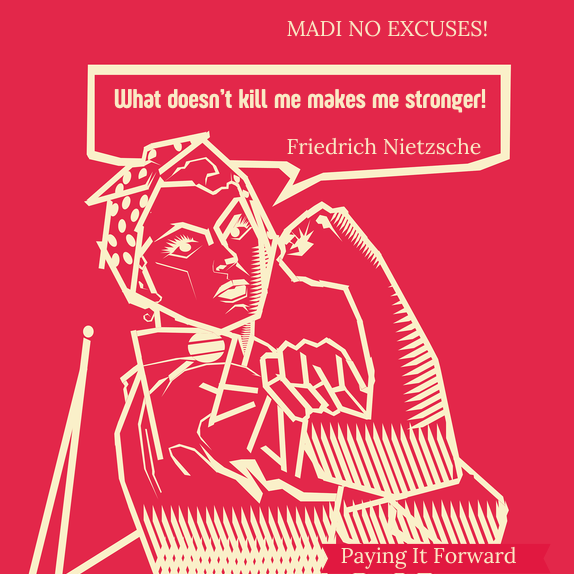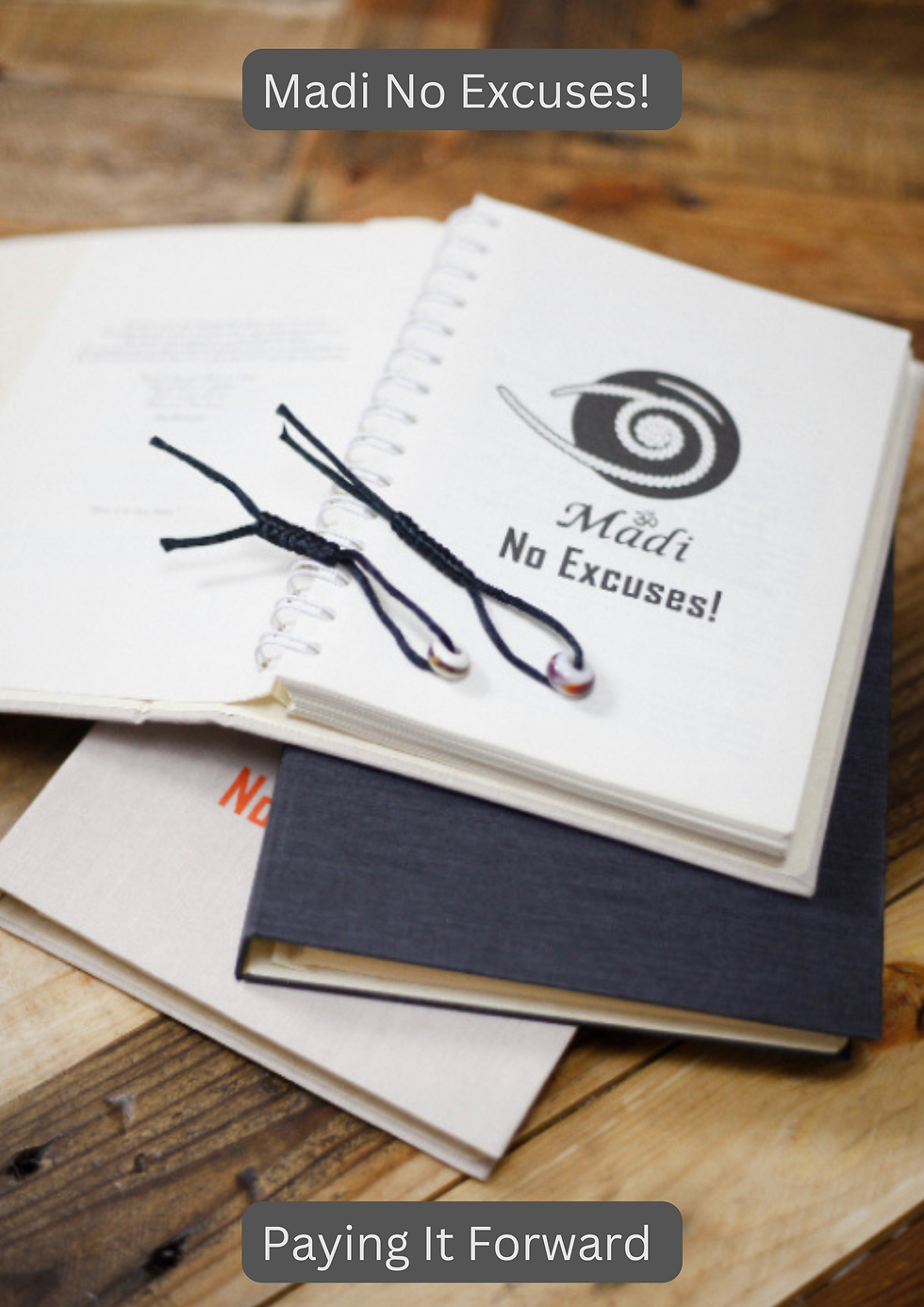Domestic violence – You are not alone
CAUTION: I know that by writing this I am talking to one in three of my audience. Recalling abuse is distressing but we need to sometimes share our stories for victims and survivors to know they are not alone, and for those fortunate not to have experienced such abuse to know a little more of the reality.
I am not sharing every detail of my story, but I made a commitment to a group of women in a domestic violence refugee in Coventry, UK, many years ago that I would stand up whenever and wherever I could to share that I too am a survivor of domestic abuse. I have kept that promise.
PLEASE, always remember... NO ONE deserves to be abused. Abuse is NEVER the fault of the victim.
For the #16Days of Activism against #DomesticAbuse, #WESTTWORLD has created a Guide for Victims and Survivors. Written by a Survivor for those at risk and those who want to help. You can find it here.
“We must take sides. Neutrality helps the oppressor, never the victim. Silence encourages the tormentor, never the tormented. Sometimes we must interfere. When human lives are endangered, when human dignity is in jeopardy, national borders and sensitivities become irrelevant. Wherever men and women are persecuted because of their race, religion, or political views, that place must - at that moment - become the center of the universe”, wrote Elie Wiese. Elie Wiese was a Romanian-born American writer, professor, political activist, Nobel laureate, and Holocaust survivor. His words highlight why injustices occur - very simply because many individuals chose to look the other way.

I know this to be true - It was my neighbours who chose not to come to help me when they heard me and my daughter screaming as my husband dragged me on the floor and kicked me with his shoes on.
Domestic violence affects 1 in 3 women and 1 in 5 men. These statistics are based on reported numbers, meaning the ratios of abuse are likely to be much higher as most incidents of violence in the home are not reported.
Violence against women and girls has reached a devastating scale around the globe.
A United Nations report revealed that approximately 736 million people worldwide, have endured physical and psychological violence. And unfortunately, this situation only deteriorated further during the COVID-19 pandemic.
In general, these statistics are global – It does not matter the country, the socio-economic conditions, the levels of education nor the cultural background of those concerned.
In short, domestic violence occurs because it is still perceived, and accepted, as a domestic issue and not a societal one. Furthermore, it is rarely associated with the truth that it represents an accurate picture of inequality, especially the power of men over women.
I will make a caveat here: Men face domestic violence from women also, and there are additionally, significant levels of same-sex gender-based violence, which I am not dismissing. However, as women remain the majority of the global population, it is the inequality between men and women that I would like to keep focus on.
Nevertheless – Violence against anyone is unacceptable. It is a crime and an injustice.

So, what is domestic violence?
For the #16Days of Activism against #DomesticAbuse, #WESTTWORLD has created a Guide for Victims and Survivors. Written by a Survivor for those at risk and those who want to help. You can find it here.
Domestic violence or domestic abuse is the power of one intimate partner over another.
The abuse often starts as psychological and emotional and can progress to economic, physical, and sexual. In its worst form, violence can result in death.
In many countries of the world, domestic violence is a crime, punishable by imprisonment – Although this is rarely implemented, as neither the police nor the judiciary understand the seriousness of these crimes. (And there is no way the already overcrowded prisons could be filled further with men who choose to beat their wives, is there???!!! )
In other countries, domestic violence is considered a cultural issue and thus publicly accepted. And in some countries, the abuse of a husband towards his wife is covered under religious law, where it is said to be endorsed by God as the way a man can control his wife.
It is not my role to argue with the laws or religion of another country, all I can argue is that a man's power and control over a woman goes against the fundamental principles of human rights which almost all countries of the world have signed up to.
I will use my case as an example of victimisation, but please be aware that every case is different.
Before marriage my husband was an angel: The perfect guardian, offering protection, security, kindness, compliments and affection – True love and the promise of a “happy ever after” future.
Soon after the marriage, the control began: “What was I doing?” “Where was I going?” “Who was I going with?” – He became very possessive.
Then the insults: “The house is not clean enough”. “Your lipstick is too bright”, “You are spending too much time with others”, “You are stupid” – Belittling me and removing my self-belief.
Then the isolation: “You should choose whether you see your family or me.” Followed by, “I want to spend more time with you because this is our life together”.
When I became pregnant, whilst he appeared happy, he became even more controlling and even jealous of the attention I gave to my unborn child. I have since learnt that domestic violence frequently begins, or increases, when a woman becomes pregnant.
At one point I remember driving to a friend’s wedding with my husband and discussing the gift we should buy. He stopped the car in a small village and told me I could get out and walk to the wedding as he was going home. He drove off, leaving me there, heavily pregnant. He did return several minutes later with his apology It was a threat towards me - I was to do as I was told.
As I had to leave work to have my children, I then became financially dependent on him - This was his ultimate power of control because I could not do anything without my own money. He asked me to account for every penny I spent.
After my second daughter, physical violence began. First with a small push, then a pair of scissors pointed at my neck, and then the slap, the punch and finally being dragged through the house by my neck and being kicked violently in front of my 4-year-old daughter.
Perpetrators of domestic abuse frighten, intimidate, terrorize, manipulate, hurt, humiliate, blame, injure, wound and even murder their victims.

Having been through this experience, I am able to put myself partly in the shoes of others in a similar situation. It is not easy to talk about but as part of my Paying It Forward commitment I would like to support those wanting to move forward to build a new life, one where they choose what their future looks like.
That’s what Paying It Forward is all about. I hope you will join us.
It’s for FREE! So, you have nothing to lose.
Why do some people stay with violent partners?
This is such a difficult question because every situation is different, and it is so difficult to put yourself in the shoes of another person.
Firstly, it's important to note that a survivor often makes several attempts to leave the abusive relationship before succeeding.
All I can tell you is that I felt trapped. I had NO ONE to turn to because I had been completely isolated, emotionally and financially.
As the victims, we are made to feel as though it is our fault, “and who would believe us anyway” because the perpetrator is so loving and kind towards us when in front of others, and rarely are the bruises visible for others to see!
It’s all about power and control.
This is where in the case of male over female domestic violence, the “male privilege” comes into play most. In the main, due to the historical control of men over women, women are expected to accept the man as the dominant partner in a relationship: He earns more, his pension is more, he is physically stronger, he won’t stop work to have children, his domestic skills are not equivalent to hers….. None of this should be true, but sadly, factually it is.
If only we could “Turn Sex On Its Head”, as I explained in my TEDx Brussels speech, we could collectively find ways to deliver parity, equality and equity.
Furthermore, very often, “for the sake of the children” women are convinced by their partner, and by family, friends and society, that causing an upset in the relationship would not be good for the children. – If only those good-willed people could hear the testimonies of children who have lived in a home with violence, they would never recommend this as a solution.
So, women often stay with their abusive partners because they believe they have no other option. They are isolated, financially dependent, intimidated or further threatened. And if they could leave, where could they go? And what about their future? – They will already have been psychologically hounded to accept that no one else would care for them as their partner had!
In my case, it was the doctor who encouraged me to leave when I visited him with all my bruises. He told me “It will never stop”.
“No matter how much he promises you that he will stop, he will not be able to keep his promise.”
He asked me to try something: "Go home and ask your husband to have some counselling for his violence. If he says yes and immediately finds a counsellor, it means he accepts he has a problem and will deal with it. If he says he will sort it out himself, or worse that he does not need counselling, then you know there will be no change."
My husband promised me never to do it again – “It was just the stress at work”. The next day I went to see a solicitor and started divorce proceedings. I was forced to stay in the same house as him during the separation which, as you could imagine, was very uncomfortable.
To finish this part of my story: Six months after our divorce, he was remarried. Several months later, one of our mutual friends called me to say that my ex-husband had thrown his wife out of the car and into a ditch in the night. She went back to him because she had a brain tumour and was afraid to be alone.
They moved to Spain so that he would not have to pay maintenance for our children, again using financial control to continue to inflict pain on me.
He returned to the UK when our youngest daughter was 18 when he was no longer obliged to pay maintenance. A few years later he died. My daughters visited him in the hospital, and in front of his wife, he told them that his greatest regret was letting me go because the success I had achieved without him had shown my true potential.
The day after his funeral, which I didn’t attend, his wife sold the house and the car and disappeared – I know the sense of relief and freedom she felt. I hope she found happiness wherever she went.
I and my team have been active in supporting survivors of domestic violence in starting their own enterprises and in building their careers. We also link to international affiliates who work in the same field.
We are here to support individuals and organisations on their journey, and especially to reassure survivors that they are not alone.
WOULD YOU LIKE SUPPORT ON YOUR PERSONAL DEVELOPMENT JOURNEY?
Being a Survivor
Let’s start by removing the victim card – Yes, I was a victim, IT WAS NOT MY FAULT, and now I am a survivor, and most importantly I do not regret anything.

Well, to start with, we are often so ashamed to say that we are victims of domestic violence that we just stay silent, with our heads bowed down, knowing that if we do say anything, society will judge us negatively!
That’s what I did for at least 3 years as I tried to survive and find opportunities for me and my children. – But now, because of my increased self-belief, and the success that each little step took me towards, I am able to share the learning, triumphs and failures, with you through these blogs.
I am PAYING IT FORWARD
I survived by becoming a Necessity Entrepreneur. Living hand to mouth to start with, by beginning a small business at home, which through hard work and focus turned into it into a bigger business, which supported not only me and my daughters but other women and men who struggled for opportunities.
That first business no longer exists, but there have been more opportunities and more businesses which have enabled me to support many more women and girls, men and boys.
In the policy field I have been able to work with the UK government, the EU Parliament and EU Commission, and the Council of Europe on actions to eradicate violence against women and gender-based violence. Much of this learning we have also passed onto other governments and organisations through our work.

I have been able to mentor and support other survivors of multiple injustices to establish and build their own enterprises, build their careers or choose the lifestyle that they want for themselves and their families.
By working with such great individuals and communities, I have been able to integrate their concerns and recommendations into the decision-making process, in the hope of driving change.
I have understood that no matter what challenges I have faced, I am privileged, and with that privilege comes responsibility. A responsibility to act in favour of justice for all.
Each challenge that I have been given has provided me with an opportunity to remain focused on my overarching commitment: To turn 7 billion ideas to action.
Now it’s your turn.
Putting your hand out to help another
For the #16Days of Activism against #DomesticAbuse, #WESTTWORLD has created a Guide for Victims and Survivors. Written by a Survivor for those at risk and those who want to help. You can find it here.
Whether you are a victim, a survivor or someone who wants to help, I am reaching out to you as part of our Paying It Forward Community.
As we know the statistics are 1 in 3, which means you are likely to know someone who is/was a victim of domestic abuse.
If you suspect that a colleague/neighbour may be in an abusive relationship, do not approach the subject directly, and never in front of the perpetrator.
Offer a coffee and build a friendship and trust to allow a safe space to open up.
If you hear or see someone being abused, please DO NOT TURN AWAY or ignore it, phone the police immediately or ask someone to go with you to check on the person.
I saw a brilliant advert in India several years ago, where a famous actor heard someone being beaten in the next room. He went with an empty cup and knocked on the door. He asked for a cup of milk. This was enough time for him to check on the victim, whilst at the same time, subtly alerting the perpetrator to the fact that his actions were not going unnoticed.
When I was in a hotel room once, I heard a woman being beaten in the next room. I immediately called reception and asked 2 receptionists to check on her, which they did. The interruption stopped the beating of the woman, for that day.
What can you do to help a victim?
Listen to the person. Let them know they are not alone, and then listen some more.
Please do not judge, and if you are not an expert please do not advise, but just listen, and then guide them towards an expert.
Encourage the person to seek expert help, maybe through a confidential hotline if they are available, or by searching to find an expert for them. If necessary, accompany them.
Ask the person if they want to report the crime to the police. Every situation and country will be different, but if they want to report the abuse as a crime, consider accompanying them because the process can be intimidating and lengthy.
I have attached a download, “No one deserves to be abused”, for both victims and those who want to understand more about what constitutes domestic violence.
You will become a member of our Paying It Forward Community.
Our website and blog will keep you updated and informed with relevant guidance to support your development.
We will also provide you with templates, e-books and downloadables that we have created to add momentum to your quest – Meaning: You will achieve your ambitions faster, overcome any challenges, and be ready to grasp new opportunities as they appear before you.
I am attaching here your first FREE downloadable – THIS IS ME! It’s a sheet for you to complete about yourself for yourself. Hopefully it will make you think about your journey. Take time to think seriously about the answers. If you want, you can send it to me when you join our community but the best thing you can do with it is to pin it somewhere you see it every day, to remind you of where you are now and where you are going.
It’s about me Paying It Forward.
If you want to know more about my story you can read my book: “Madi No Excuses”. The objective of the book is to turn 7 Billion Ideas to Action - Including YOURS!
If you would like to order the book with free delivery, please use this link Madi No Excuses!

Gandhi said, “You must be the change YOU want to see”
Madi says, “You must be the change YOU want to see – NO EXCUSES!”

Founder Madi Group www.madisharma.org
Founder Women’s Eco-nomic & Social Think Tank www.westtworld.com
Author Madi No Excuses! www.madinoexcuses.com
Entrepreneur, International Speaker, Freelance Journalist
Listed as 1 of apolitical’s 100 Most Influential People in Gender Policy in 2018
@MadiSharma1

Comments